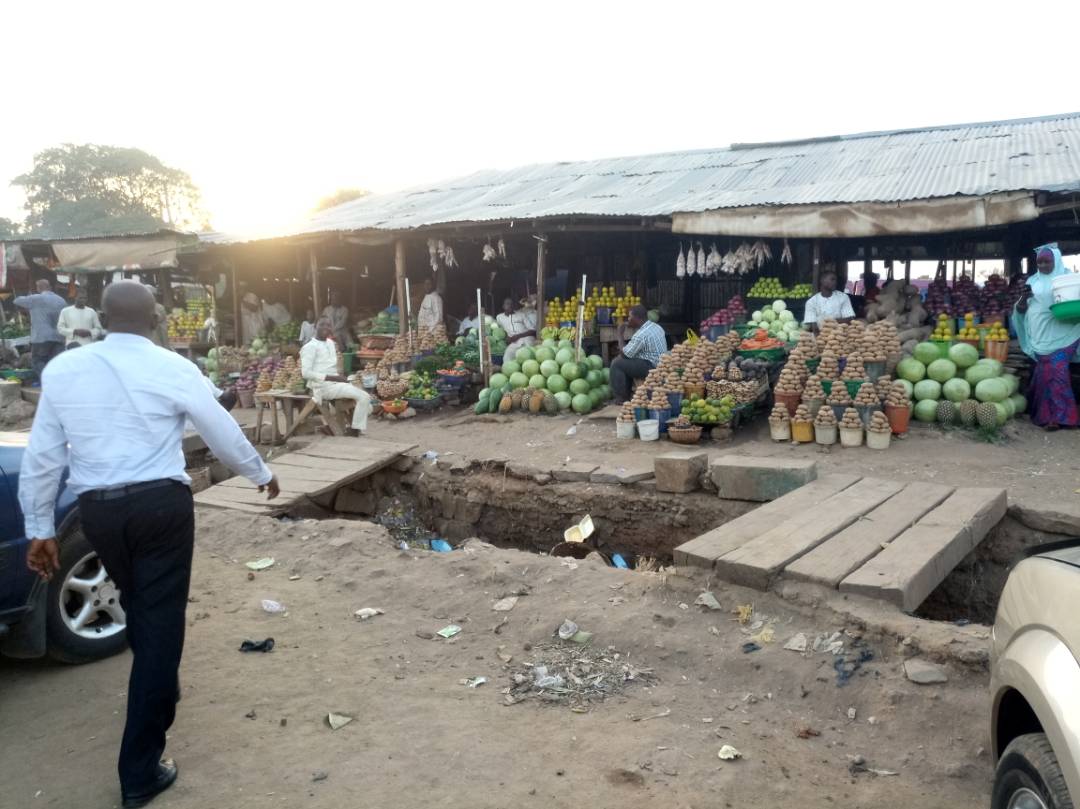During the first Techpoint Tour, I visited the large expanse of land housing the Station Market in Kaduna State where foodstuff, fruits and vegetables are sold. The market was recently relocated here from its former location that was razed by an electric fire.
Everyday, different fruits and vegetables are brought from farms around and in neighbouring states to this market.
In trying to strike a bargain for an extra-large watermelon, the trader surprisingly accepted my price offer too quickly. It was baffling, but our host explained the catch.
Everyday, a cargo train left Kaduna laden with fruits from this market and headed to Lagos. Only one train can leave in a day and this means only a few traders can get their goods on at once; there was never enough room. If the trader did not quickly sell off this watermelon — or any other perishable fruit –, it would most likely go bad the next morning as there was no storage facility to keep them fresh until the next transport schedule.
This is not a sustainable method as Kaduna remains one of the largest producers of food crops in Nigeria; there was always more fruit in the market than can be sold in a day.
Everyday, when it closed at night, the Station Market transformed into a living breathing carcass of dead and decayed fruits, food and vegetables.
Fruit rotted on a daily basis incurring loss to their owners and this is the major reason I got my watermelon at a surprising price bargain.
According to the Food and Agriculture Organization of the United Nation (FAO), every year 1.3 billion tonnes of food are either lost or wasted. This is an estimated one-third of the food produced in the world annually for human consumption.
Ironically, regardless of a reported 220 million undernourished people, Sub Saharan Africa is the location for most of this food waste.
Because of the perishable nature of fresh food, fruits and vegetables, their life cycles are very short. And this already shortened lifespan is even further reduced under heat in tropical climates.
So in Nigeria, fruits and vegetables are a seasonal affair. Once a fruit goes out of season, it is usually goodbye till the next year or cycle and this is bad for many reasons.
Around the world, businesses involved with food usually have the lowest entry barriers and are also some of the most profitable.
Because of this, there is an abundance of start-ups and SMEs in Nigeria delivering fresh food; there seems to be a new one everyday.
Nigeria has a population in the hundreds of millions who need to eat. So online greengrocers, fresh food start-ups and businesses should be breaking the bank, yes? NO.
Saudat Salami is the CEO of EasyShop EasyCook, an ecommerce grocery store that has been online going on 13 years now. Hers is unarguably one of Nigeria’s oldest ecommerce stores.
Suggested read; Meet Saudat Salami, the Mother of Nigeria eCommerce
In a series of tweets, Saudat said;
“Building a website or an app is the simplest thing in an online grocery business. When you finish that then you realise the agric industry is the bedrock of your success.”
Everyday I see a new online grocery company spring up. Hubs keep rolling them in from one end. The glamour of online business. I laugh in broken food chain. If only all the sector needs is codes we will be alright.
— Saudat Salami (@SaudatSalami) February 13, 2018
In summary, she opined — from experience — that every chain of Nigeria’s agricultural industry is broken; from logistics, equipment to financing and storage. And all these are problems that surpass building fancy websites.
In all the food waste in Sub Saharan Africa, climatic conditions ensure most losses likely occur in post-harvest stages especially for fruit and vegetables. And a large percentage of these losses can be linked to inefficiencies in the different stages of production.
Like its name implies, Post Harvest Losses (PHL) are losses incurred on food, fruits and vegetables after harvest. From inadequate farming equipment, seeds, to transportation, PHL occurs for a lot of reasons, but storage is the biggest of these problems, especially in Nigeria. And storage is a bigger problem because when other parts of the aforementioned agricultural chain is failing or inadequate it can be a buffer.
This storage problem has ironically rendered the most profitable of businesses useless in these climes.
In order to increase the farmer’s income, make sure the middle men (fresh food delivery startups and grocery businesses) earn enough money and still reduce food waste the storage aspect of the agricultural food chain must be fixed. How can this be done effectively?
Collaborative infrastructure
Some vegetables lose flavour and essence when refrigerated, but a larger number need to be stored in cool temperatures. So freezing and cooling still remain the best options for keeping vegetables fresh in the tropics at least till they reach market.
Andrew is a Lagos based Heating, Ventilation, and Air Conditioning (HVAC) expert and according to his estimates, the cost of a cold room may be prohibitive for an average farmer or fresh food delivery startup to own.
These things [cold rooms] are in different sizes. A pre-owned 12 by 12 can cost between ₦500,000 to ₦700,000. While a 20 ton cold room retails for as high as ₦40 million depending on the location. And refrigerating vans are anything from ₦5 million to ₦20 million for second-hand value.
A more detailed pricing list from another HVAC company does not differ too much from Andrew’s.
These prohibitive amounts have not factored in the cost of fueling the cooling engines on a daily basis considering Nigeria’s epileptic power supply. Considering all these prohibitive costs, collaborative infrastructure is the only way a growing or struggling business can make profit while avoiding wastage. What is this?
Collaborative infrastructure is two or more parties working together to provide basic physical and organizational structures and facilities necessary to the effective running of their businesses that will not have been easily achieved for financial or related reasons.
Saudat Salami is an advocate of collaboration. She says collaboration and not competition is the only way farmers and greengrocers in Nigeria and Sub Saharan Africa can make optimum profit on their produce while avoiding post-harvest losses.
Nigerian entrepreneurs are not very strong on collaboration, but Saudat says there is no other way, especially in the agricultural space.
Collaboration is the only way for SMEs and startups to scale up as there is no room for anything else. There are too many people doing the same things and wasting resources and produce operating alone. Small business owners need to come together with like minds and vision and find ways to merge businesses for scale. Go big or go home is the popular saying but you can’t go big all by yourself,” she said.
A number of farmers and greengrocers can come together, form a cooperative and build a standard cold room and storage facility. When this is not financially feasible, there are cheaper options.
Fishmongers in Lagos and some other parts of Nigeria have since mastered this art of collaborating on infrastructure. As most have to hawk and display their wares under the scorching sun, the fishes must stay cold.
These fishmongers pool financial resources, and rent part of a commercial cold room to refrigerate their fishes between sales.
Apart from commercial cold rooms, there is another unexplored method to save perishable food.
Cooling vans for party and event planners are always empty when not in use. Farmers and green grocers can jointly pay for this idle machines and use them.
Madam Tee is an event planner and owns a cooling van. She excitedly agreed when I asked if she will accommodate farmers and greengrocers for a fee. For her it was a way to make extra revenue from storing produce in her van. As she had not done it before, Madam Tee isn’t sure of what a standard pricing structure will be like.
Nnaemeka Ikweguonu’s ColdHubs are another good example of how collaborative infrastructure can be deployed.
https://twitter.com/dw_environment/status/971200924344553472?s=19
The ColdHubs are “120mm insulated “plug and play” modular, solar-powered walk-in cold room, for 24/7 off-grid storage and preservation of perishable foods. Adequately addressing the problem of post- harvest losses in fruits, vegetables and other perishable food.”
These options seriously need to be considered as regardless of being a food producing country, Nigeria still imports a mind-blowing amount of food.
In September 2016, the then Minister of State for Agriculture and Rural Development, Heineken Lokpobiri, said Nigeria spends about ₦6.6 trillion annually on food importation. The amount was more than the 2016 national budget of ₦6.06 trillion.
This is a prime indicator that agriculture can be Nigeria’s — and indeed the continent’s — goldmine. This “goldmine” will be bigger than any real goldmine that ever existed because of Africa’s teeming population and the simple fact that ‘everyone has to eat’.
During the gold rush of 1849 in California, very few prospectors found gold and became rich. But those that sold tools and supplies to these miners became richer; Levi Strauss was one of them.
Like those goldmines in old California, the owners, investors, and enablers of collaborative infrastructure will trigger this agricultural revolution and become rich in the process while banishing food waste and hunger from Nigeria and the African continent by extension.
In the words of Saudat Salami, “Whoever builds and or owns the infrastructure wins.”






